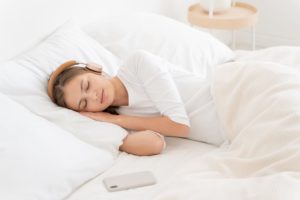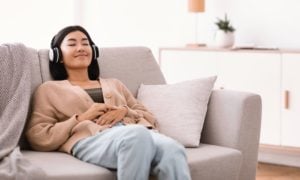When you buy through our links, we may earn a commission. Products or services may be offered by an affiliated entity. Learn more.
Music and Sleep
- Playing music before bed may decrease the time it takes to fall asleep and improve sleep quality.
- Music has been shown to decrease levels of a stress hormone called cortisol.
- Music triggers the release of dopamine, which can boost good feelings at bedtime and may help manage pain.
- Try falling asleep to music that is relaxing or slower, around 60 to 80 beats per minute.
Music is a powerful art form. While it may get more credit for inspiring people to dance, it also offers a simple way to improve sleep hygiene, improving your ability to fall asleep quickly and feel more rested.
Music can aid sleep by helping you feel relaxed and at ease. With streaming apps and portable speakers, it’s easier than ever to take advantage of the power of music wherever you go. Given music’s accessibility and potential sleep benefits, it might be a good time to try adding it to your nightly routine.
Looking to improve your sleep? Try upgrading your mattress.
Can Music Help You Fall Asleep?
Parents know from experience that lullabies and gentle rhythms can help babies to fall asleep. Science supports this common observation, showing that children of all ages, from premature infants to elementary school children, sleep better after listening to soothing melodies.
Fortunately, children aren’t the only ones who can benefit from lullabies before bedtime. People across age groups report better sleep quality after listening to calming music.
In one study, adults who listened to 45 minutes of music before going to sleep reported having better sleep quality beginning on the very first night. Even more encouraging is that this benefit appears to have a cumulative effect with study participants reporting better sleep the more often they incorporated music into their nightly routine.
Using music can also decrease the time it takes to fall asleep. In a study of women with symptoms of insomnia, participants played a self-selected album when getting into bed for 10 consecutive nights. Before adding music to their evening routine it took participants from 27 to 69 minutes to fall asleep, after adding music it only took 6 to 13 minutes.
In addition to facilitating quickly falling asleep and improving sleep quality, playing music before bed can improve sleep efficiency, which means more time that you are in bed is actually spent sleeping. Improved sleep efficiency equals more consistent rest and less waking up during the night.
Why Does Music Affect Sleep?
The ability to hear music depends on a series of steps that convert sound waves coming into the ear into electrical signals in the brain. As the brain interprets these sounds, a cascade of physical effects are triggered within the body. Many of these effects either directly promote sleep or reduce issues that interfere with sleep.
Several studies suggest that music enhances sleep because of its effects on the regulation of hormones, including the stress hormone cortisol. Being stressed and having elevated levels of cortisol can increase alertness and lead to poor sleep. Listening to music decreases levels of cortisol, which may explain why it helps put people at ease and release stress.
Music triggers the release of dopamine, a hormone released during pleasurable activities, like eating, exercise, and sex. This release can boost good feelings at bedtime and address pain, another common cause of sleep issues. Physical and psychological responses to music are effective in reducing both acute and chronic physical pain.
Listening to music can also contribute to relaxation by soothing the autonomic nervous system. The autonomic nervous system is part of your body’s natural system for controlling automatic or unconscious processes, including those within the heart, lungs, and digestive system. Music improves sleep through calming parts of the autonomic nervous system, leading to slower breathing, lower heart rate, and reduced blood pressure.
Many people with poor sleep associate their bedrooms with frustration and sleepless nights. Night-time noise, whether it’s from roads, airplanes, or noisy neighbors, can decrease sleep efficiency and is linked to several adverse health consequences including cardiovascular disease. Music can help to drown out noises and distract from troubling or anxious thoughts.
What Kind of Music Is Best For Sleep?
It’s natural to wonder about the best type of music for sleep. Research studies have looked at diverse genres and playlists and there isn’t a clear consensus about the optimal music for sleep. What we do know is that studies have typically used either a self-curated playlist or one that has been designed specifically with sleep in mind.
One of the most significant factors in how music affects a person’s body is their own musical preferences. Effective custom playlists may include songs that have been relaxing or that have helped with sleep in the past.
When designing a playlist, one factor to consider is the tempo. The tempo, or speed, at which music is played is often measured in the amount of beats per minute (BPM). Most studies have selected music that is around 60-80 BPM. Because normal resting heart rates range from 60 to 100 BPM, it’s often hypothesized that the body may sync up with slower music.
For those that don’t want to design their own playlist, many online music services have helpful playlists curated for sleep or relaxation. Feel free to experiment with different songs and playlists until you find one that’s right for you. It may also be helpful to try out a few playlists during the daytime to see if they help you relax.
Music Therapy
While many people can benefit from making their own playlists or finding something pre-mixed, others may benefit from a more formal approach. Certified music therapists are professionals trained in using music to improve mental and physical health. A music therapist can assess a person’s individual needs and create a treatment plan that can involve both listening to and creating music. For more information on music therapy, talk with your doctor or visit the American Music Therapy Association.
Evolving Science About Music and Health
Interest in music’s effects on the body continues to grow, and major research programs are dedicated to uncovering new ways that music can benefit health. For example, in 2017 the National Institutes of Health partnered with the John F. Kennedy Center for the Performing Arts to announce the Sound Health Initiative. This program initiative supports research that focuses on the use of music in health care settings and has already funded several projects.
How to Make Music Part of Your Sleep Hygiene
Music can be a great part of healthy sleep hygiene. Here are a few tips to keep in mind while incorporating music into a sleep-promoting evening routine.
- Make it a habit: Routine is great for sleep. Create evening rituals that give the body sufficient time to wind down, incorporating music in a way that’s calming and consistent.
- Find enjoyable songs: If a pre-made playlist isn’t working, try making a mix of songs that you find enjoyable. While many people benefit from songs with a slower tempo, others may find relaxation with more upbeat music. Feel free to experiment and see what works best.
- Avoid songs that cause strong emotional reactions: We all have songs that bring up strong emotions. Listening to those while trying to sleep may not be a great idea, so try music that’s neutral or positive.
- Be careful with headphones: Headphones and earbuds may cause damage to the ear canal while sleeping if the volume is too high. Sleeping with earbuds can also lead to a buildup of earwax and may increase the risk of ear infections. Instead, try setting up a small stereo or speaker somewhere close to the bed. Choose speakers without bright light, which can interfere with sleep, and find a volume that is soothing and not disruptive.

Still have questions? Ask our community!
Join our Sleep Care Community — a trusted hub of sleep health professionals, product specialists, and people just like you. Whether you need expert sleep advice for your insomnia or you’re searching for the perfect mattress, we’ve got you covered. Get personalized guidance from the experts who know sleep best.
References
11 Sources
-
Loewy, J., Stewart, K., Dassler, A. M., Telsey, A., & Homel, P. (2013). The effects of music therapy on vital signs, feeding, and sleep in premature infants. Pediatrics, 131(5), 902–918.
https://publications.aap.org/pediatrics/article/131/5/902/31313/The-Effects-of-Music-Therapy-on-Vital-Signs -
Tan L. P. (2004). The effects of background music on quality of sleep in elementary school children. Journal of music therapy, 41(2), 128–150.
https://academic.oup.com/jmt/article-lookup/doi/10.1093/jmt/41.2.128 -
Lai, H. L., & Good, M. (2005). Music improves sleep quality in older adults. Journal of advanced nursing, 49(3), 234–244.
https://onlinelibrary.wiley.com/doi/10.1111/j.1365-2648.2004.03281.x -
Johnson J. E. (2003). The use of music to promote sleep in older women. Journal of community health nursing, 20(1), 27–35.
https://www.tandfonline.com/doi/full/10.1207/S15327655JCHN2001_03 -
National Institute on Deafness and Other Communication DIsorders. (2018, January). How do we hear?.
https://www.nidcd.nih.gov/health/how-do-we-hear -
Koelsch, S., Fuermetz, J., Sack, U., Bauer, K., Hohenadel, M., Wiegel, M., Kaisers, U. X., & Heinke, W. (2011). Effects of Music Listening on Cortisol Levels and Propofol Consumption during Spinal Anesthesia. Frontiers in psychology, 2, 58.
https://pubmed.ncbi.nlm.nih.gov/21716581/ -
Chai, P. R., Carreiro, S., Ranney, M. L., Karanam, K., Ahtisaari, M., Edwards, R., Schreiber, K. L., Ben-Ghaly, L., Erickson, T. B., & Boyer, E. W. (2017). Music as an Adjunct to Opioid-Based Analgesia. Journal of medical toxicology, 13(3), 249–254.
https://pubmed.ncbi.nlm.nih.gov/28646359/ -
Low, P. (2020, April). Merck Manual Consumer Version: Overview of the Autonomic Nervous System.
https://www.merckmanuals.com/home/brain,-spinal-cord,-and-nerve-disorders/autonomic-nervous-system-disorders/overview-of-the-autonomic-nervous-system -
Hume, K. I., Brink, M., & Basner, M. (2012). Effects of environmental noise on sleep. Noise & health, 14(61), 297–302.
http://www.noiseandhealth.org/text.asp?2012/14/61/297/104897 -
Zhang, J. M., Wang, P., Yao, J. X., Zhao, L., Davis, M. P., Walsh, D., & Yue, G. H. (2012). Music interventions for psychological and physical outcomes in cancer: a systematic review and meta-analysis. Supportive care in cancer : official journal of the Multinational Association of Supportive Care in Cancer, 20(12), 3043–3053.
http://link.springer.com/10.1007/s00520-012-1606-5 -
A.D.A.M. Medical Encyclopedia. (2019, February 7). Pulse.
https://medlineplus.gov/ency/article/003399.htm







